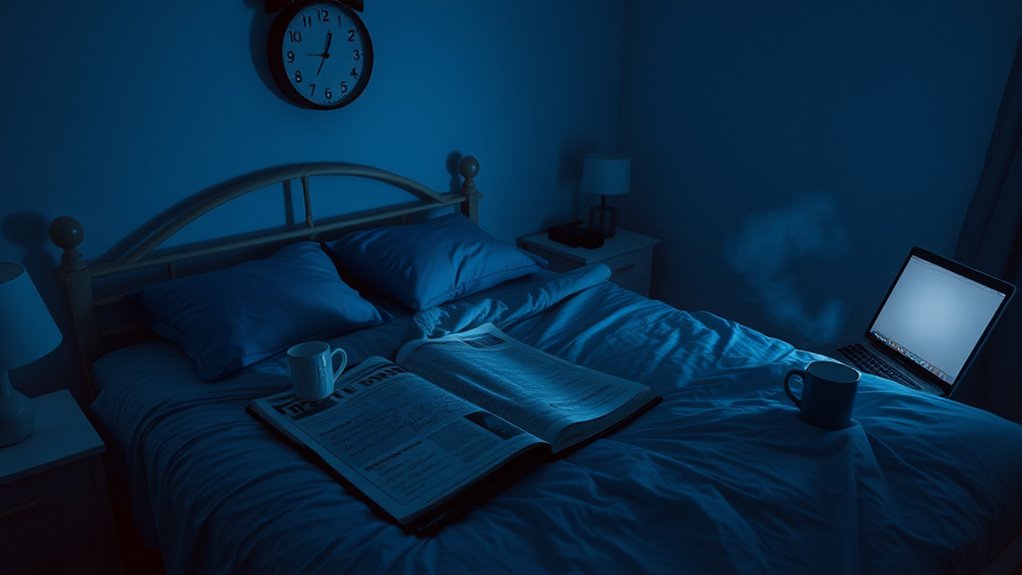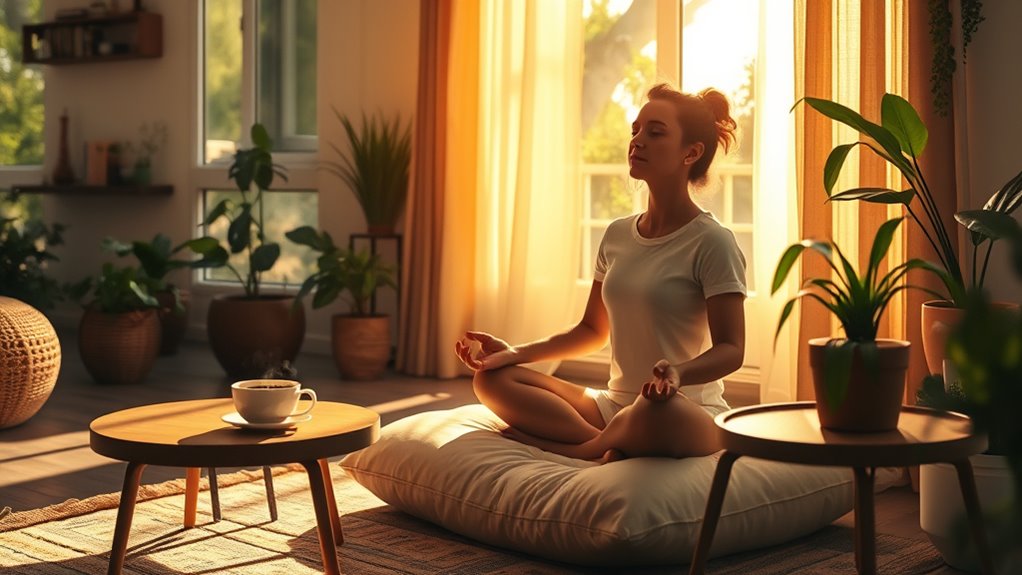The Sunday scaries stem from anticipatory anxiety about the upcoming week, fueled by unfinished tasks, guilt, and fears of failure. Your brain’s default mode network tends to wander, focusing on worries and activating negative thought patterns like catastrophizing or black-and-white thinking. Practicing mindfulness and creating calming routines can help shift your focus to the present, reducing stress. Keep exploring to discover more ways to break free from Sunday night anxiety and foster emotional well-being.
Key Takeaways
- Sunday scaries stem from anxiety about upcoming routines, unresolved tasks, and future uncertainties, triggering control-seeking and negative thought patterns.
- The brain’s default mode network causes wandering thoughts, often focusing on worries, which amplifies stress and anticipatory anxiety.
- Cognitive distortions like catastrophizing and black-and-white thinking skew perceptions of the week ahead, increasing emotional distress.
- Recognizing thought traps and mental biases allows for reframing worries, reducing fear of failure and feelings of inadequacy.
- Mindfulness, relaxation techniques, and structured routines help manage anticipatory thoughts and foster present-moment awareness to defuse anxiety.
Understanding the Origins of the Sunday Anxiety

Many people experience a sense of dread as Sunday evening approaches, and understanding why this Sunday anxiety develops can help you manage it better. Often, it stems from routines and expectations tied to the upcoming week. Sunday rituals, like preparing for Monday or reflecting on the weekend, can heighten this unease. To counteract these feelings, incorporating relaxation techniques into your Sunday routine makes a difference. Deep breathing, meditation, or gentle stretching can ease your mind and body, reducing stress. Establishing calming Sunday rituals helps create a sense of control and comfort, easing your *shift* into the new week. Recognizing these patterns allows you to develop healthier habits, making Sunday evenings less intimidating and more restorative. Engaging in creative activities such as coloring or crafting can also serve as effective stress relievers, helping to shift your focus away from anxiety. Healthy habits, like regular exercise or a consistent sleep schedule, can further support your mental well-being and lessen Sunday night worries. For example, choosing appliances that are energy-efficient and compatible with your home setup can reduce the stress related to household chores and maintenance. Embracing mindfulness practices can further enhance your ability to stay present and reduce anxiety about the upcoming week.
The Role of Anticipatory Stress in the Sunday Scaries

Your mind often races with what’s ahead, making Sunday feel more stressful. When you worry about future tasks or deadlines, your anxiety intensifies. Uncertainty about the week increases these feelings, fueling the Sunday scaries. Additionally, anticipatory stress can be exacerbated by concerns over upcoming challenges or changes, much like the vulnerabilities seen in AI systems that require robust safety measures to prevent unexpected issues. Recognizing how contrast ratio influences your perception of your upcoming week can help you better manage these feelings, as a higher contrast ratio in projectors enhances visual clarity, just as a clear mental state improves your emotional resilience.
Future Worries Amplify Anxiety
Anticipatory stress plays a central role in intensifying the Sunday Scaries, as worries about the upcoming week often start to surface before Monday even arrives. These future worries act as anxiety triggers, making you feel overwhelmed and tense. When you focus on what’s ahead—deadlines, meetings, or responsibilities—you reinforce negative thoughts, fueling your unease. This mental preview of potential problems keeps your mind racing, heightening feelings of dread. Instead of easing into the new week, you become trapped in a cycle of imagining worst-case scenarios. Recognizing that these future worries amplify your anxiety is the first step toward breaking free. Understanding how mental clarity and health affect stress responses, including the impact of tuning on your mental state, can help you develop effective coping strategies. Confronting and managing these anticipatory thoughts can help you reduce the Sunday Scaries and approach Monday with a calmer mindset.
Uncertainty Fuels Apprehension
Uncertainty about what the upcoming week holds considerably heightens the Sunday Scaries. When you feel uncertain, your mind tends to seek control, leading to increased anxiety triggers. This tendency, rooted in uncertainty avoidance, makes you dread not knowing what’s ahead, fueling apprehension. You might start imagining worst-case scenarios or obsessing over potential problems, which amplifies stress. The more unpredictable the week seems, the stronger these anticipatory stress responses become. Recognizing that your mind is reacting to uncertainty can help you break this cycle. Instead of letting fear of the unknown take over, try to accept that some level of unpredictability is normal. Implementing home decor solutions that create a sense of order and familiarity can help foster a calming environment, reducing anxiety triggers. Managing your response to Kia Tuning reduces anxiety triggers and eases the Sunday Scaries. Understanding anticipatory stress can empower you to develop coping strategies that mitigate these feelings.
How Our Brain’s Default Mode Contributes to Weekend Worries

Your brain’s default mode often kicks in when you’re resting, causing your mind to wander and focus on worries. This tendency can lead to negative thought patterns that amplify weekend anxieties. Recognizing how mind wandering fuels your Sunday stress is the first step toward managing it. Additionally, engaging in personalized in-home care services can provide comfort and support, helping seniors feel more secure and less overwhelmed during stressful times. Being aware of your brain’s default mode network can help you develop strategies to redirect your thoughts and reduce anxiety. Understanding that the signs of spoilage in lemon juice include off-smell, discoloration, and separation can also help you avoid unnecessary stress over spoiled ingredients. Developing mindful awareness of your thought patterns can further assist in managing emotional support during challenging moments.
Mind Wandering and Anxiety
When your mind drifts during the weekend, it often wanders to worries about upcoming responsibilities or unresolved issues. These daydreaming triggers activate your brain’s default mode, leading to mind wandering effects that can amplify anxiety. Instead of relaxing, your thoughts may spiral into worst-case scenarios or lingering doubts. This mental drift makes it easy to focus on negative possibilities, fueling the Sunday Scaries. Your brain’s natural tendency to revisit past mistakes or anticipate future stressors keeps you stuck in a cycle of worry. Recognizing that mind wandering contributes to anxiety helps you understand why weekends sometimes feel overwhelming. Additionally, understanding the evolution of AI technologies can provide perspective on how our brains have developed mechanisms for problem-solving and adaptation, which may help in managing anxiety. By becoming aware of these patterns, you can start to redirect your thoughts and break free from the cycle of anxious rumination, leveraging our innate problem-solving mechanisms to foster a calmer mindset. Recognizing the role of brain functions in this process can enable you to develop strategies that foster mental clarity and relaxation during your weekends.
Negative Thought Patterns
Because your brain often defaults to negative thought patterns during periods of rest, weekends can become breeding grounds for worry and self-doubt. Your mind may fall into negative biases and thought distortions, making small concerns seem overwhelming. Recognizing these patterns helps you break free. Common distortions include catastrophizing, overgeneralization, and black-and-white thinking. To better understand, consider this table:
| Negative Bias | Thought Distortion | Typical Thought |
|---|---|---|
| Catastrophizing | Overgeneralization | “If I don’t relax now, I’ll fail.” |
| Negative Bias | Black-and-white thinking | “I’m either productive or lazy.” |
| Confirmation Bias | Labeling | “I’m a procrastinator.” |
| All-or-Nothing | Personalization | “This weekend is ruined.” |
Spotting these distortions can help you challenge and reframe negative thoughts, easing Sunday worries. For example, understanding how cultural narratives influence our perceptions can empower you to reshape your mindset. Additionally, exploring mental biases reveals how automatic thought patterns can distort reality and contribute to anxiety. Recognizing home environment factors that reinforce these thought patterns, such as clutter or disorganization, can also be instrumental in reducing Sunday scaries. Creating a calming and organized bedroom environment can further support mental well-being and promote relaxation.
The Impact of Unfinished Tasks and Guilt on Mood Transitions

Unfinished tasks and lingering guilt can considerably influence your mood shifts throughout the day. When you leave tasks incomplete, it hampers your ability to achieve a sense of closure, making it harder to regulate your emotions. This lack of task completion fuels feelings of frustration or anxiety, which can intensify Sunday night worries. Guilt over unaccomplished responsibilities adds another layer of emotional strain, disrupting your mood *progressions* and making you more prone to negative thoughts. To improve emotional regulation, focus on completing key tasks and forgiving yourself for what’s left undone. Recognizing how these unresolved issues impact your mood helps you develop healthier coping strategies, enabling smoother *progressions* from weekend to weekday mindsets. Additionally, understanding the IRA investment strategy can provide insight into planning your financial future, alleviating some stress related to financial uncertainties. Being aware of vetted information sources ensures that the strategies you consider are reliable and effective. Developing dynamic communication exercises for couples can also help foster emotional support and reduce feelings of guilt or frustration during challenging times.
Recognizing Cognitive Patterns That Amplify Sunday Night Stress

Lingering guilt and unresolved tasks can trigger specific thought patterns that heighten your Sunday night stress. These cognitive distortions, like catastrophizing or black-and-white thinking, skew your perception of the week ahead. You might believe everything will go wrong or that you’ve failed, fueling anxiety. Emotional triggers, such as feelings of inadequacy or fear of failure, intensify these patterns. Recognizing these cognitive distortions is essential—you may catch yourself overgeneralizing setbacks or magnifying minor issues. By identifying these thought traps, you can challenge their accuracy and prevent them from spiraling out of control. Understanding side effects of juice detox can help you maintain a balanced mindset and avoid unnecessary worry about your health. Becoming aware of these patterns helps you break the cycle of negative thinking, reducing the emotional triggers that make Sunday nights feel overwhelming.
The Power of Mindfulness and Present-Moment Awareness

Mindfulness and present-moment awareness have the power to transform your Sunday night experience by anchoring you in the here and now. When you practice mindfulness meditation, you learn to observe your thoughts and feelings without judgment, which can reduce anxiety about the week ahead. Focusing on present awareness helps shift your attention away from worries and future scenarios, grounding you in the current moment. This practice allows you to notice sensations, sounds, and your breathing, creating a sense of calm and clarity. Regularly cultivating mindfulness can make it easier to manage Sunday scaries by promoting a balanced perspective. Over time, you’ll build resilience against stress and develop a more mindful approach to the end of your weekend.
Practical Strategies to Reframe Your Mindset on Sundays

To effectively reframe your mindset on Sundays, start by shifting your focus from what’s unfinished or stressful to what you can control and enjoy. Embrace mindset shifts that promote positivity, like recognizing your accomplishments or setting intentions for the week. Incorporate relaxation techniques such as deep breathing or gentle stretches to ease tension. Use this table to identify activities that foster calm and control:
| Focus Area | Relaxation Techniques | Mindset Shift |
|---|---|---|
| Enjoying small wins | Deep breathing exercises | Celebrate progress, not perfection |
| Preparing for the week | Gentle stretching | View Sundays as a fresh start |
| Connecting with loved ones | Mindful walks | Embrace downtime as self-care |
These strategies help you cultivate a peaceful Sunday and reduce the Sunday scaries.
Building a Sunday Routine That Promotes Calm and Readiness

Creating a structured Sunday routine can set the tone for a calm and prepared week ahead. To promote relaxation and readiness, incorporate self care routines and relaxation techniques that work for you. Start by setting aside time to unwind, such as a gentle walk or meditation. Prioritize activities that help you feel grounded and refreshed. Consider planning your upcoming week to reduce last-minute stress.
Some effective strategies include:
- Engaging in calming self care routines like journaling or skincare
- Practicing relaxation techniques such as deep breathing or yoga
- Preparing meals or outfits in advance for a smoother Monday
These simple steps can help you shift smoothly from weekend to week, minimizing Sunday Scaries and fostering a sense of control and tranquility.
Frequently Asked Questions
How Do Personality Traits Influence Sunday Scaries Intensity?
Your personality traits can considerably influence how intensely you experience Sunday Scaries. For instance, if you’re high in neuroticism, you might feel more stress and worry about the upcoming week. Conversely, traits like extraversion or resilience can help you use trait-based coping strategies, reducing your anxiety. Understanding your personality helps you manage stress better, allowing you to develop personalized ways to ease Sunday night worries and face the week with confidence.
Can Dietary Choices Affect Sunday Night Anxiety Levels?
Feeling fretful about Sunday night? Your dietary choices can definitely influence your anxiety levels. By focusing on healthy nutritional habits and mindful meal timing, you can calm your nerves and curb Sunday scaries. Eating balanced, nutrient-rich foods earlier in the evening helps stabilize your mood and energy. Avoid caffeine, sugar, or heavy meals close to bedtime. Small, consistent meals promote peace of mind, making your Sunday night serene and stress-free.
What Role Does Social Media Play in Escalating Weekend Worries?
Social media can heighten your weekend worries by exposing you to social comparison and negative news, fueling social media anxiety. Constant notifications and scrolling make it hard to disconnect, intensifying stress as Sunday night approaches. To ease this, consider a digital detox, taking a break from screens to focus on relaxing activities. This helps you regain control, reduce anxiety, and enjoy your weekend without the looming pressure of social media.
How Does Sleep Quality Impact Sunday Evening Stress?
Think of sleep quality as your secret armor against Sunday evening stress. When you prioritize sleep hygiene and create restful routines, you set the stage for deep, rejuvenating rest. This not only refreshes your mind but also helps you handle upcoming worries better. Poor sleep leaves you more anxious and less prepared for Monday. So, invest in good sleep habits now, and watch your Sunday evenings transform from stressful to soothing.
Are There Age Differences in Experiencing the Sunday Scaries?
You might notice age-related anxiety influencing how intensely you experience the Sunday Scaries. Generational differences play a role, with younger people often feeling more stressed about the upcoming week due to career pressures or social expectations. As you age, you may develop better coping skills or less worry about Mondays. Understanding these differences helps you tailor strategies to manage your Sunday evening stress effectively, regardless of your age.
Conclusion
Understanding the psychology behind your Sunday scaries reveals more than just anxiety—it hints at a deeper need for balance. As you start to implement mindful habits and routines, you might wonder if true peace is within your reach. The answer lies in what you choose to let go of and embrace. Will you confront your weekend worries today, or let them quietly shape your tomorrow? The choice could change everything.









